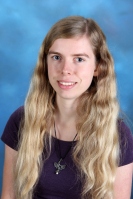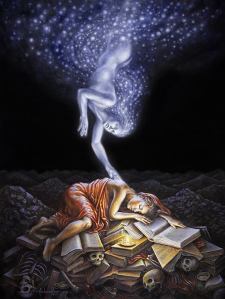Mary-Jean Harris writes our fourth guest blogpost for the 18 days of Tesseracts. Her Story, “The Shadow of Gods,” appears in Wrestling with Gods: Tesseracts 18.
___________
Questions of knowledge and faith have occupied the thoughts of philosophers since the Ancient Greeks, and still, we struggle to have a grasp of what it really is to “know” something.
In my short story, “The Shadows of Gods,” in the Tesseracts 18 anthology, Toulouse, a young man in the seventeenth century, is grappling with ideas of knowledge of higher worlds and magic. He wants to experience these for himself so he might come to truly know about God, about what lies at the foundation of our existence. He has learned about many different religions and gods, but, until the end of the story, has not experienced the truth of any of them himself. This involves an element of faith, for how is it that we can come to know something, and how, when we experience it, do we know it’s true? First, let’s think about faith (faith in a religion, or in any power beyond the physical world).
Having faith in something is to believe in it without having a logical reason, but that doesn’t mean it’s unfounded. It can be believing in something on an intuitive level that cannot be explained by reason. It is something we experience with an inner sense, and so it is not something you can point to or describe as you would describe a physical object.
Yet even without considering spiritual experiences, can we really know anything? Of course, we can doubt that our senses give us reliable information, but most people take for granted that what they experience is a real physical world. Even if they don’t have perfectly accurate perceptions of it, they still believe that these have some sort of correspondence to the world around them.
Many philosophers have debated such issues. In particular, Descartes concluded that the only thing we know that exists is our mind, which is, in essence, a thinking thing. Everything else that we can perceive, from our own body to the planet Pluto, can be doubted. In his Meditations of First Philosophy he said, “Whatever I have accepted until now as most true has come to me through my senses. But occasionally I have found that they have deceived me, and it is unwise to trust completely those who have deceived us even once.” So if we submit to this standard of knowledge, that knowledge must be from something which we can never be deceived about, how can we know anything?
When in doubt, my motto is, “turn to the Ancient Greeks.” In particular, Socrates would serve us well here, seeing as he (purportedly) said, “True knowledge is in knowing you know nothing.” Indeed, the more we “know”, or at least, the more we learn about something, the more we come to see our ignorance of the world, not to mention that which lies above and beyond our perceptions. What is there? I don’t know, for I can’t perceive it. Although it may seem paradoxical to say that “I know nothing” (because don’t you have to at least “know” that you know nothing?), I think it is quite fitting here. We are aware of our limitations, and since we do not know the true source of what we perceive, we cannot really say that we understand anything, for all that we perceive arises from it, whatever “it” may be.
And yet, when one has a spiritual experience such as Toulouse had in the story, it is often a sudden insight to something beyond the ordinary world around us, and he seems to “know” at once. Yet is this knowledge? It is as though his direct insight has bypassed the corridors of knowledge and has touched that deeper place which knowledge would eventually lead to, namely, truth. What Toulouse experiences from that goddess-like presence is not knowledge per se, but a glimpse of something truer, something that may form the basis of our existence, something that is the source of us and everything around us. He must have faith that it is true, but this faith, I believe, can still be well-founded.
Indeed, in many ways, faith can be built from as a series of experiences that help us reach the truth. It is faith simply because we have bypassed the mind’s discursive way of knowing. Even before such experiences, we may have insights, or perhaps intuitions, that lead us to believe in something “on faith”. This is a similar idea, and we are always in a process of “wrestling” with these two ways of reaching truth, for we are not infallible, and so could be led astray by both knowledge and direct insights (these two kinds of knowledge were also explored by the Ancient Greeks).
So when writing my story, I tried to explore (and not necessarily clarify) ideas about faith and knowledge. In particular, the meaning that we can ascribe to our experiences, particularly those of a spiritual nature. And yet when something touches your soul, can you know it any deeper? As mentioned above, maybe you can surpass the process of “knowledge” entirely to reach toward perceiving the truth, at least, to a catch glimpse of it.
It’s a paradox of knowledge, and one that, perhaps by definition, we’ll never really know.
_______________
 Mary-Jean Harris writes historical and other-world fantasy stories. She is a student at the Perimeter Institute in Waterloo studying theoretical physics, and has previously studied physics and philosophy at Carleton University. She has travelled over Canada and the U.S, as well as England, Scotland, and Peru and hopes to travel to many other interesting places. Mary-Jean is the author of Aizai the Forgotten; to learn more, visitwww.thesoulwanderers.blogspot.ca/.
Mary-Jean Harris writes historical and other-world fantasy stories. She is a student at the Perimeter Institute in Waterloo studying theoretical physics, and has previously studied physics and philosophy at Carleton University. She has travelled over Canada and the U.S, as well as England, Scotland, and Peru and hopes to travel to many other interesting places. Mary-Jean is the author of Aizai the Forgotten; to learn more, visitwww.thesoulwanderers.blogspot.ca/.
